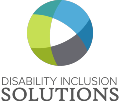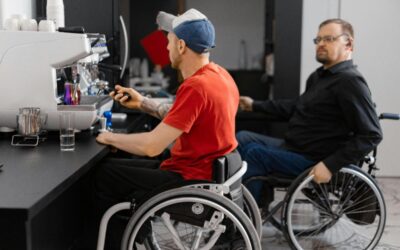People with disabilities have always had more trouble securing jobs than their abled counterparts, especially during hard economic times. Programs like AbilityOne are especially helpful to bridge the gap. This decades-old program was established to create employment opportunities for people with disabilities. A few years ago, I had the opportunity to discuss the program on FedNews.
Captioned video:
Video transcript:
ANNOUNCER: From News Channel 8, this is Federal News Tonight.
HOST: Well, as I mentioned earlier, President Obama signed the Jobs Bill today, one step in the process to get thousands of Americans back to work. But even before the nation’s economic downturn, there was a part of the population that experienced an even higher rate of unemployment, the disabled. So, what is being done to help those who struggle to find work has been made even harder by the troubled economy.
Joining us now to talk a little bit about this from the AbilityOne Program is Andy Houghton and Thomas Panek. Thank you both for being here with us this evening.
THOMAS PANEK: You’re welcome.
ANDREW HOUGHTON: Thank you for having us.
HOST: Andy, let’s start with you. First of all, tell me a little bit about the program, first of all.
ANDREW HOUGHTON: Well, the AbilityOne program is a seventy-year-old program that is established to create employment opportunities for people with significant disabilities and those who are blind. It is a jobs program. It leverages the buying power of the federal government to create employment around the country. So, individuals with disabilities are manufacturing products for our military such as it could be anything from M16 cartridges to uniforms to many other products, anything the government buys.
In addition, we provide a great deal of services for the federal government and it’s people with significant disabilities doing the work and providing the services for our federal customers.
HOST: And Thomas, I’m curious. You know, we say a higher unemployment rate here. The figure I have here is 14%, a little bit higher than the national average of about 10%. Why do you think that number is a little bit higher? We see on job applications. Is it a discrimination thing or is it just more difficult, frankly, to get a job? What do you think is behind that figure?
THOMAS PANEK: Well, Phil, I think there are a couple of issues at work. First of all, we believe that the number is quite a bit higher than that.
HOST: Really?
THOMAS PANEK: The number of Americans, working age Americans who are blind, for example, like myself, who are not employed is estimated to be seven out of ten, so it is around 30% have positions. So, it is a significant problem.
HOST: Right.
THOMAS PANEK: And at National Industries for the Blind, our mission is to enhance the opportunities for personal and economic independence for people who are blind and we do that through employment. So, it’s exactly the issue that we address through our program.
HOST: And what has your personal experience been with dealing with this?
THOMAS PANEK: Well, I have had two times in my life, once as a young adult when I was losing my sight, and second when I was looking for my next career opportunity in a tough jobs market, and both times, the AbilityOne program has been there for me. The first time was through the Chicago Lighthouse for the Blind and Visually Impaired where I was learning how to use a cane and technology adaptive equipment and they assisted me through that transition process. Then now on the leadership team of National Industries for the Blind.
HOST: And Andy, we were talking about the Jobs Bill here today. Is there anything in it that you’re aware of that could be particularly helpful to this particular sort of cause in your organization?
ANDREW HOUGHTON: Absolutely. Whenever there is funding for significant infrastructure projects or other projects that do go through the federal government, it does increase opportunities for the people with disabilities in our program. The government is spending money, buying goods and services and investing in the development of certain projects around the country and there is always an opportunity for our agencies to – to provide those services or those goods.
HOST: This is sort of a question for both of you. Do you think the challenges, are there less challenges? Is this just sort of one step in decreasing the challenges that you face?
THOMAS PANEK: Well, I think it’s a wonderful program that is able to address a specific need around the employment issue for people who are blind or severely disabled.
HOST: Right.
THOMAS PANEK: And our program is designed specifically to help people like us to get jobs and we do a very good job at using technology to adapt to a work environment and also to provide quality jobs for people at a time when it is very difficult for the general population to find them.
HOST: And Andy, go ahead. I wanted to get to you too.
ANDREW HOUGHTON: This is one – this is one opportunity for folks in a continuum of employment opportunities, but the bottom line is it is obvious that it is more difficult for people with disabilities to find employment. There are stereotypes. There are challenges. There are transportation issues. The AbilityOne program certainly is one of those solutions.
HOST: We’re just about out of time here but I do want to pass along for viewers, anybody who is interested in more information, can they find you on the web? How can they get in touch with you?
ANDREW HOUGHTON: Yes, they can. AbilityOne dot gov.
HOST: Alright. Great. Thomas, Andy, thank you both for being here with us this evening. We appreciate it.
THOMAS PANEK: You’re welcome. A pleasure. Thank you.
ANDREW HOUGHTON: Thank you.
HOST: More Federal News coming up right after the break. We’ll be right back.





0 Comments